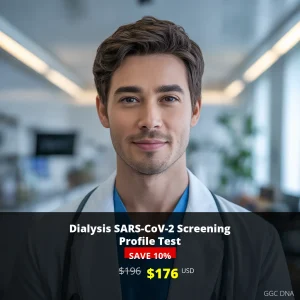Epstein-Barr Virus Antibody to Viral Capsid Antigen VCA IgM Test
Understanding Epstein-Barr Virus and VCA IgM Testing
The Epstein-Barr Virus Antibody to Viral Capsid Antigen VCA IgM Test represents a critical diagnostic advancement in identifying recent or active Epstein-Barr virus (EBV) infections. EBV, a member of the herpesvirus family, is one of the most common human viruses worldwide, with over 90% of adults showing evidence of past infection. This specialized test specifically detects IgM antibodies directed against the viral capsid antigen, which typically appear early in the course of primary EBV infection and indicate current or recent viral activity.
What Does the EBV VCA IgM Test Measure?
This sophisticated diagnostic test utilizes Enzyme Immunoassay technology to precisely measure IgM class antibodies that target the Epstein-Barr virus capsid antigen. The test specifically identifies:
- Early immune response to EBV infection
- Recent viral exposure and active replication
- Primary infection phase markers
- Acute phase immunological response
Clinical Significance of VCA IgM Detection
The presence of VCA IgM antibodies typically indicates a recent EBV infection, usually within the past 2-3 months. These antibodies are among the first to appear during primary infection and generally persist for 4-8 weeks before declining. The test’s high specificity makes it particularly valuable for distinguishing between current and past EBV infections.
Who Should Consider EBV VCA IgM Testing?
This test is recommended for individuals experiencing symptoms suggestive of infectious mononucleosis or recent EBV infection, including:
- Persistent fever lasting more than a few days
- Severe sore throat with tonsillar enlargement
- Swollen lymph nodes in the neck and armpits
- Profound fatigue and general malaise
- Enlarged spleen or liver involvement
- Unexplained rash following antibiotic use
- Individuals with compromised immune systems
- Patients with suspected chronic active EBV infection
Key Benefits of EBV VCA IgM Testing
Accurate Diagnosis and Timely Intervention
The EBV VCA IgM test provides numerous clinical advantages:
- Early Detection: Identifies recent EBV infections when symptoms first appear
- Differential Diagnosis: Helps distinguish EBV from other viral infections with similar presentations
- Treatment Guidance: Informs appropriate management strategies and prevents unnecessary antibiotic use
- Comprehensive Assessment: When combined with other EBV antibody tests, provides a complete picture of infection status
- Rapid Results: Same-day reporting available for timely clinical decisions
Understanding Your Test Results
Interpreting EBV VCA IgM Findings
Your test results will fall into one of several categories, each with specific clinical implications:
Positive VCA IgM Result
A positive result typically indicates:
- Recent primary EBV infection (within past 2-3 months)
- Active infectious mononucleosis
- Current viral replication and immune response
- Need for appropriate symptomatic management and monitoring
Negative VCA IgM Result
A negative result generally suggests:
- No recent EBV infection
- Past infection with established immunity
- Symptoms may be due to other causes requiring further investigation
- Possible testing too early in infection course
Clinical Correlation and Follow-up
It’s essential to interpret EBV VCA IgM results in the context of clinical symptoms, timing of symptom onset, and potentially other EBV antibody tests. Your healthcare provider will consider these factors alongside physical examination findings to make an accurate diagnosis and develop an appropriate management plan.
Test Information and Pricing
| Test Component | Details |
|---|---|
| Test Name | Epstein-Barr Virus Antibody to Viral Capsid Antigen VCA IgM Test |
| Regular Price | $52 USD |
| Discount Price | $46 USD |
| Sample Type | 2 mL (1 mL min.) serum from 1 SST |
| Turnaround Time | Same day (sample submitted by 9 AM) |
| Testing Method | Enzyme Immunoassay |
| Preparation | No special preparation required |
Convenient Testing Locations Across the USA
GGC DNA maintains comprehensive testing facilities throughout major metropolitan areas, ensuring accessible EBV diagnostic services for patients nationwide. Our strategically located branches provide professional sample collection and rapid processing capabilities.
Nationwide Coverage
We serve patients across all major US cities including New York, Los Angeles, Chicago, Houston, Phoenix, Philadelphia, San Antonio, San Diego, Dallas, San Jose, and many more. Our extensive network ensures you can access quality EBV testing services wherever you are located.
Take Control of Your Health Today
Don’t let unexplained symptoms persist without proper diagnosis. The EBV VCA IgM test provides crucial information about recent Epstein-Barr virus infections, enabling appropriate medical management and peace of mind. With our discounted price of $46 and same-day results availability, there’s no reason to delay this important diagnostic step.
Ready to Schedule Your Test?
Contact our dedicated healthcare team today to book your Epstein-Barr Virus VCA IgM test. Our experienced professionals are available to answer your questions and facilitate prompt testing arrangements.
Call or WhatsApp: +1(267) 388-9828
Schedule your appointment now and take the first step toward accurate diagnosis and effective symptom management. Our team is committed to providing exceptional service and reliable results you can trust.







